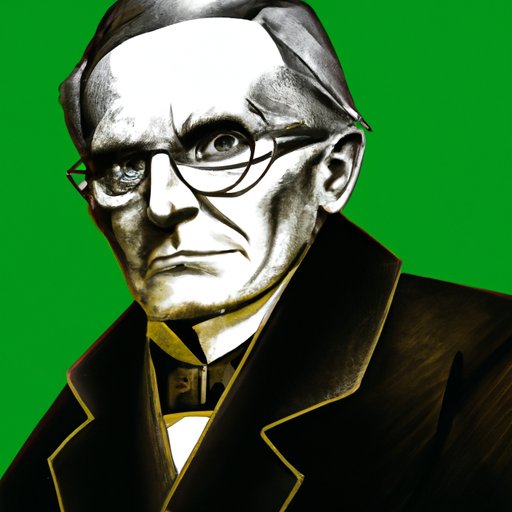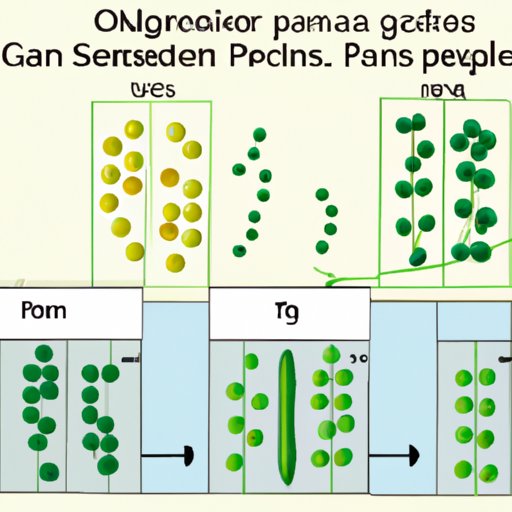Introduction
Gregor Mendel was an Austrian scientist and monk who is widely regarded as the “father of genetics” for his pioneering research in the field. Born in 1822, Mendel conducted experiments with pea plants over the course of eight years that resulted in his discovery of the fundamental laws of heredity. His revolutionary findings laid the groundwork for the development of modern genetics and have had a profound impact on our understanding of biology.
Exploring the Life and Legacy of Gregor Mendel
Mendel was born in what is now the Czech Republic and attended the University of Vienna in the 1840s. After completing his studies, he joined an Augustinian monastery where he became a priest and devoted himself to teaching and scientific research. It was during this time that he began experimenting with pea plants and made his groundbreaking discoveries.
Mendel’s experiments focused on the study of inheritance, or how characteristics are passed down from one generation to the next. He studied seven different traits in pea plants, including flower color, seed shape, and stem length, and developed a system of crossbreeding to observe how these traits were inherited. By carefully tracking the results of each crossbreed, he was able to identify patterns in the transmission of traits and formulate his famous laws of heredity.

The Revolutionary Discoveries of Gregor Mendel
Mendel’s experiments revealed three major genetic principles that are still used today. First, he discovered that there are dominant and recessive genes, meaning that some genes can mask the expression of other genes. Second, he formulated the law of segregation, which states that two copies of a gene (one from each parent) must be separated in order for them to be inherited by offspring. Finally, he developed the law of independent assortment, which explains how traits inherited from each parent can be combined in different ways in offspring.
These discoveries revolutionized the field of genetics, as they provided a framework for understanding the transmission of traits from one generation to the next. Prior to Mendel’s work, it was believed that traits were blended together in offspring, but his experiments proved that this was not the case. His findings marked a turning point in the history of biology and paved the way for further advances in the field.
How Gregor Mendel’s Experiments Changed Science
Mendel’s experiments sparked a new interest in the study of heredity and led to the emergence of genetics as a field of scientific inquiry. His groundbreaking discoveries inspired a wave of research into the underlying mechanisms of inheritance, and scientists around the world began conducting their own experiments to build upon his findings.
Today, Mendel’s work has had an immense impact on modern-day science. His theories have been applied to a wide range of disciplines, including medicine, agriculture, and evolutionary biology. His discoveries have also played an important role in the development of genetic engineering, which has enabled scientists to manipulate the genetic makeup of organisms for various purposes.

Uncovering the Laws of Heredity Through Gregor Mendel
Mendel’s experiments demonstrated that certain characteristics are inherited in predictable patterns. He identified two types of genes: dominant genes, which are expressed in offspring, and recessive genes, which are masked by the expression of dominant genes. He also discovered that traits are inherited independently from one another, meaning that the expression of one trait does not affect the expression of another.
Mendel’s most famous discovery was the law of segregation, which explains how two copies of a gene (one from each parent) are separated during the formation of gametes (sex cells). This law states that alleles (alternative forms of a gene) are randomly distributed into gametes, so that each gamete carries only one allele for each gene. Additionally, Mendel formulated the law of independent assortment, which states that the inheritance of one trait does not affect the inheritance of another trait.
A Closer Look at Gregor Mendel’s Genetics Research
Mendel’s experiments involved crossing different varieties of pea plants and observing the physical characteristics of their offspring. He carefully tracked the inheritance patterns of these traits, noting which ones were dominant and which ones were recessive. He also developed the Punnett square, which is used to predict the possible outcomes of genetic crosses.
Through these experiments, Mendel was able to uncover the basic principles of heredity and develop the first model for understanding how traits are passed down from one generation to the next. His discoveries laid the foundation for the development of modern genetics and opened up a whole new field of scientific study.
An Overview of Gregor Mendel’s Contributions to Genetics
Mendel’s work revolutionized the field of genetics by demonstrating that traits are inherited in predictable patterns. His experiments showed that there are dominant and recessive genes, and that traits are inherited independently of one another. He also formulated the laws of segregation and independent assortment, which are still used today to explain the inheritance of traits.
Mendel’s discoveries had a profound impact on our understanding of heredity and sparked a wave of research into the underlying mechanisms of inheritance. His groundbreaking research laid the groundwork for the development of modern genetics and has had a lasting influence on science.
Examining the Impact of Gregor Mendel on Modern-Day Science
Mendel’s discoveries have had a significant impact on modern-day science. His work has helped to advance our understanding of genetics and has enabled us to apply his principles to the study of heredity in humans and other organisms. His research has also had a major influence on the fields of medicine and agriculture, as it has allowed scientists to develop new methods for diagnosing and treating diseases, as well as increasing crop yields through selective breeding.
Mendel’s work has also helped to shed light on the evolutionary process, as his theories provide insight into how traits are passed down from one generation to the next. His discoveries have enabled us to better understand the forces that shape life on Earth and our place in the universe.
Conclusion
Gregor Mendel was a visionary scientist whose groundbreaking discoveries in the field of genetics revolutionized the field of biology. Through his meticulous experiments with pea plants, he uncovered the basic principles of heredity and formulated the laws of segregation and independent assortment. His work has had a lasting influence on science, as his theories have been applied to a wide range of disciplines, from medicine and agriculture to evolutionary biology.
Mendel’s pioneering research in genetics has enabled us to better understand the transmission of traits from one generation to the next and has had a profound impact on our understanding of biology. His discoveries have changed the way we view the world and our place in it and will continue to shape the future of science for generations to come.
(Note: Is this article not meeting your expectations? Do you have knowledge or insights to share? Unlock new opportunities and expand your reach by joining our authors team. Click Registration to join us and share your expertise with our readers.)
